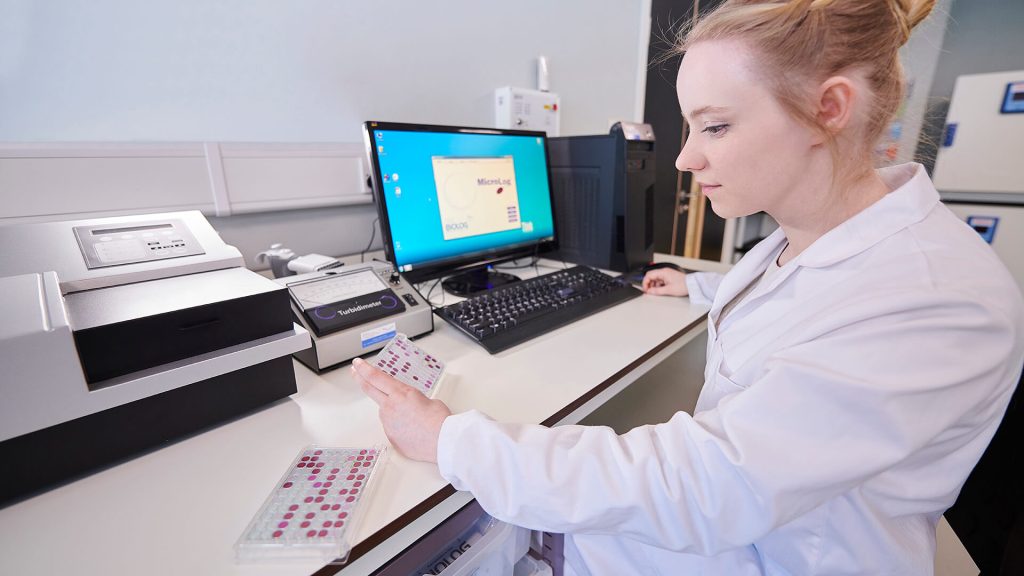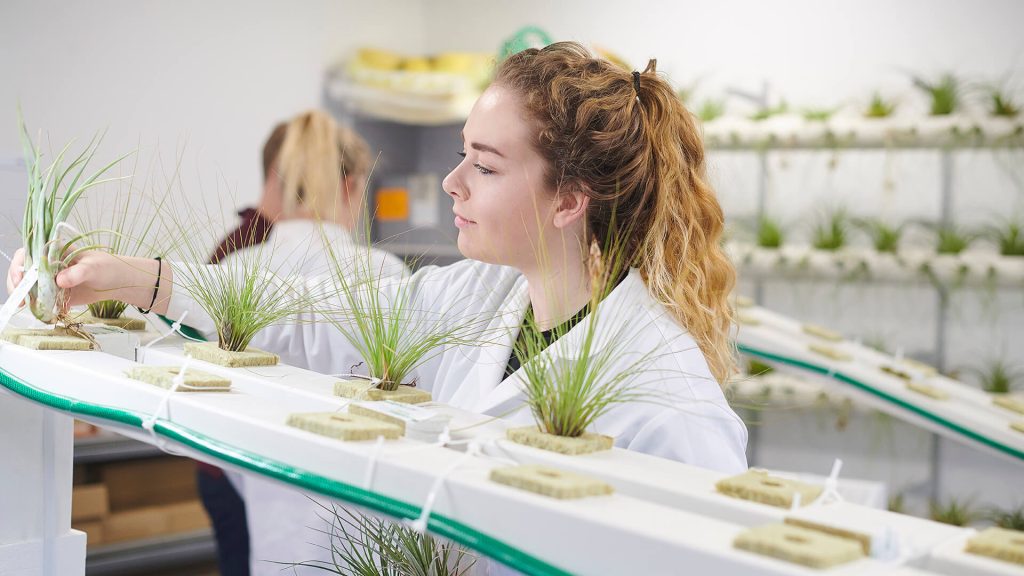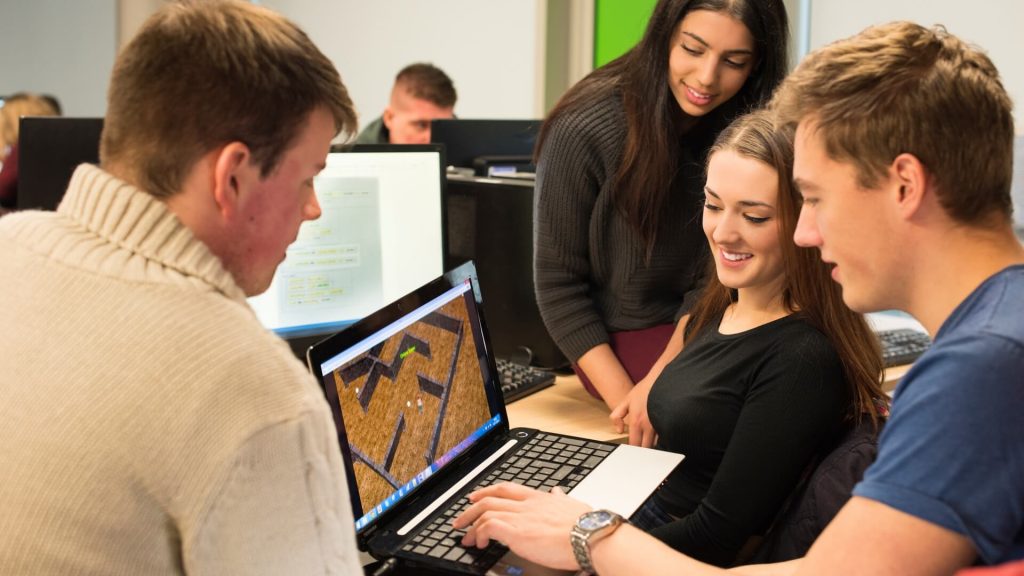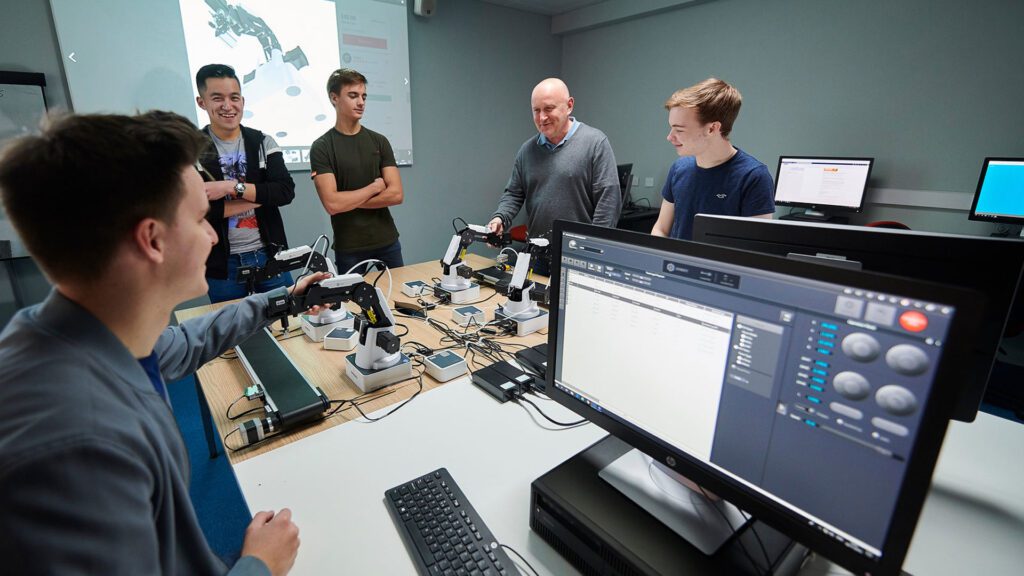STEM Foundation Year
UCAS code: Varies by pathway
Develop the key transferable skills and subject-specific knowledge needed to join science-based degrees in the subject areas of biology, computer science, engineering or geography at Edge Hill University.
Overview
| Course length: | 4 years full-time |
|---|---|
| Start dates: | September 2024 September 2025 |
| Location: | Edge Hill University |
| Subject(s): | Biology and BiosciencesComputing, IT and MathematicsEngineering and PhysicsGeography and Geology |
| Faculty: | Arts and Sciences |
| Department: | Language Centre |

The STEM Foundation Year provides the opportunity to study an integrated 4-year programme where you will complete a Foundation Year before progressing onto a degree in biology, computer science, engineering, or geography and geology, subject to passing all assessments. The information below describes the Foundation Year only. The curriculum for the subsequent three years is outlined in the Progression Routes section at the bottom of this page.
The STEM Foundation Year provides the opportunity to develop scientific skills and knowledge, tailored to your individual needs, that will enable you to progress onto the first-year of selected science-based degrees at Edge Hill University. The programme equips you with the key transferable skills needed for higher education and future employment. It is suitable if you meet the University’s minimum entry criteria but do not meet the subject-specific requirements for science-based courses or wish to extend your scientific knowledge base prior to joining a relevant degree. You will develop skills in academic writing, critical analysis, systematic thinking and personal reflection, and receive a broad overview of applied mathematics and physics. The programme includes three pathways which enable you to enhance your scientific knowledge in computer programming, biology or geography. The pathway you will study is determined by your intended degree.
Please note, this Foundation Year does not normally lead to an award or qualification in its own right, however successful completion of the Foundation Year at the required pass mark enables progression onto a relevant degree at Edge Hill University.
Please note, BSc (Hons) Web Design, Development and Analytics with Foundation Year is not available as a progression route for September 2024 entry.
Course features
-
International students can apply
What you'll study
The STEM Foundation Year combines the core fundamental knowledge, which underpins science subjects, with the skills that form the foundation of studying at university.
You will hone your skills in academic writing and critical analysis, and reflect on your academic experiences. A group project enables you to work as part of a team and produce a significant piece of work focused on the acquisition, handling and application of a wide range of information sources.
You will also receive a firm grounding in applied mathematics and physics and study one of three subject-specific modules that provide introductions to computer programming, biology and geography. The optional module studied will be determined by your intended degree upon completion of the Foundation Year.
On successful completion of the STEM Foundation Year, you will progress to Year 1 of your intended degree.
How you'll study
The programme focuses on student activity as a means of learning. Classes are highly interactive, with practical application of concepts a key factor, as well as cases drawn from real-life. Workshops, seminars, group tutorials and practical activities provide opportunities for you to work interdependently.
The STEM Foundation Year is delivered on a full-time basis. You may be required to attend up to four days a week. Upon completion of the STEM Foundation Year, you will continue your degree on a full-time basis, with the option to switch to part-time delivery on some programmes if you wish, subject to availability.
How you'll be assessed
You will be assessed through a combination of practical exercises, reports, essays, presentations and examinations. We want you to develop the ability to work effectively both independently and as part of a team. Assessment therefore includes both forms of participation, though the emphasis is strongly on individual work.
Who will be teaching you
You will learn about the very latest developments in subjects from tutors who are leaders in their fields and whose research feeds directly into their teaching. The programme team regularly engage with the wider business and academic environment in sharing knowledge, while also contributing to academic conferences and journals.
Entry criteria
Entry requirements
Typical offer 72-96 UCAS Tariff points, for which no specific subjects are required, plus GCSE Mathematics at Grade C or Grade 4 or above (or equivalent).
Example offers
| Qualification | Requirement |
|---|---|
| A Level | DDD-CCC. |
| BTEC Extended Diploma (or combination of BTEC QCF qualifications) | Merit, Merit, Pass (MMP). |
| T Level | Overall grade of Pass (E or above on the core). |
| International Baccalaureate (IB) | We are happy to accept IB qualifications which achieve the required number of UCAS Tariff points. |
| Access to Higher Education Diploma | 45 credits at Level 3, for example 24 credits at Merit and 21 credits at Pass. The required total can be attained from various credit combinations. |
Please note, the above examples may differ from actual offers made. A combination of A Level and BTEC awards may also be accepted.
If you have a minimum of two A Levels (or equivalent), there is no maximum number of qualifications that we will accept UCAS points from. This includes additional qualifications such as Extended Project Qualification (EPQ), AS Levels that haven't been continued to A Level, and General Studies AS or A Level awards.
English language requirements
International students require IELTS 6.0, with a score no lower than 5.5 in each individual component, or an equivalent English language qualification.
If your current level of English is half a band, one band, or one-and-a-half bands lower, either overall or in one or two elements, you may want to consider our Pre-Sessional English course.
How to apply
Apply full-time
Read our guide to applying through UCAS to find out more about the application process.
International
Please see our international student pages for further information about how to apply as a prospective international student.
Each course has a bespoke UCAS code for its four-year pathway which includes the integrated foundation year.
UCAS codes for Biology progression routes
- BSc (Hons) Biology with STEM Foundation Year – C109
- BSc (Hons) Biomedical Science with STEM Foundation Year – B919
- BSc (Hons) Biotechnology with STEM Foundation Year – B219
- BSc (Hons) Ecology & Conservation with STEM Foundation Year – C189
- BSc (Hons) Genetics with STEM Foundation Year – SR99
- BSc (Hons) Plant Science with STEM Foundation Year – CC29
UCAS codes for Computer Science and Engineering progression routes
- BSc (Hons) Computer Engineering with STEM Foundation Year – G609
- BSc (Hons) Computer Science with STEM Foundation Year – CS19
- BSc (Hons) Computing with STEM Foundation Year – G419
- BSc (Hons) Computing (Games Programming) with STEM Foundation Year – G619
- BSc (Hons) Computing (Networks, Cyber Security and Forensics) with STEM Foundation Year – I299
- BEng (Hons) Electrical and Electronic Engineering with STEM Foundation Year – H699
- MEng (Hons) Electrical and Electronic Engineering with STEM Foundation Year – H612
- BEng (Hons) Mechanical Engineering with STEM Foundation Year – H399
- MEng (Hons) Mechanical Engineering with STEM Foundation Year – H303
- BSc (Hons) Information Technology Management for Business with STEM Foundation Year – GN59
- BSc (Hons) Mathematics with STEM Foundation year (2025 start) – G101
- BSc (Hons) Robotics & Artificial Intelligence with STEM Foundation Year – GH79
- BSc (Hons) Web Design, Development and Analytics with STEM Foundation Year – W4D9
UCAS codes for Geography and Geology progression routes
- BSc (Hons) Geography with STEM Foundation Year – F809
- BSc (Hons) Physical Geography & Geology with STEM Foundation Year – FF69
- BSc (Hons) Geology with Physical Geography with STEM Foundation Year – 8T19
Should you accept an offer of a place to study with us and formally enrol as a student, you will be subject to the provisions of the regulations, rules, codes, conditions and policies which apply to our students. These are available at www.edgehill.ac.uk/studentterms.
If you join a full time undergraduate degree at Edge Hill University, we will guarantee you the offer of a room in our halls of residence for the first year of your course.
Discover our accommodation
Facilities
 The STEM Foundation Year is delivered by the Language Centre, located in Creative Edge, a state-of-the-art £17million building offering highly contemporary suites of outstanding facilities.
The STEM Foundation Year is delivered by the Language Centre, located in Creative Edge, a state-of-the-art £17million building offering highly contemporary suites of outstanding facilities.
Upon successful completion of the STEM Foundation Year, you will be based in the Department of Biology, Department of Computer Science or Department of History, Geography and Social Sciences, depending on your chosen degree.
Where you'll study
Creative Edge
BioSciences
GeoSciences
Tech Hub
Finance
Tuition fees
UK Full-Time
£9,250
a year
International
£16,500
a year
EU/EEA and Swiss students who have settled or pre-settled status under the EU Settlement Scheme, as well as Irish nationals, may be eligible for the UK tuition fee rate.
Financial support
Subject to eligibility, UK students joining this course can apply for a Tuition Fee Loan from the Government to cover the full cost of tuition fees. UK students enrolling on the course may also be eligible to apply for additional funding to help with living costs.
Please view the relevant Money Matters guide for comprehensive information about the financial support available to eligible UK students.
EU/EEA and Swiss students who have settled or pre-settled status under the EU Settlement Scheme may be eligible to apply for financial support. Irish nationals can ordinarily apply to Student Universal Support Ireland (SUSI). If you are an EU student who does not have settled or pre-settled status, or are an international student from a non-EU country, please see our international student finance pages.
Your future career
The programme will equip you with the skills, knowledge and understanding required to progress onto Year 1 of your intended degree in biology, computer science, engineering or geography at Edge Hill University.
Please note, places on specific degrees are subject to availability and cannot be guaranteed. In the unlikely event that your intended degree is not available upon successful completion of the STEM Foundation Year, you will be offered the opportunity to progress onto the first year of an alternative degree relevant to your choice of specialism.
You should be aware that the STEM Foundation Year is designed to enable progression onto relevant degrees at Edge Hill University and may not be accepted by other institutions.
Course changes
Every effort has been made to ensure the accuracy of this information, however our courses are subject to ongoing review and development. Changing circumstances may necessitate alteration to, or the cancellation of, courses.
Changes may be necessary to comply with the requirements of professional bodies, revisions to subject benchmarks statements, to keep courses updated and contemporary, or as a result of student feedback. We reserve the right to make variations if we consider such action to be necessary or in the best interests of students.






























